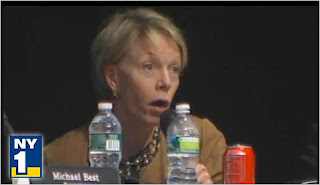Bloomberg gets his way - Steiner gave him the out, after all - and Cathie Black is in.
http://www.nytimes.com/2010/11/27/nyreg ... ck.html?hp
Fair use archive, link given, strictly non-commercial, for criticism, education and debate.
November 26, 2010
Deal for Academic Deputy Paves Way for Schools Chief
By JAVIER C. HERNANDEZ
Mayor Michael R. Bloomberg reached a deal Friday to save the tottering candidacy of Cathleen P. Black to be the next chancellor of New York City schools, agreeing to appoint a career educator who started as a classroom teacher to serve as her second in command.
As a result, the state education commissioner, David M. Steiner, has agreed to grant Ms. Black, a media executive, the exemption from the normal credentials required by state law for the position, according to a person with direct knowledge of the negotiations.
The move was a significant concession by Mr. Bloomberg, who has often resisted efforts from outside City Hall to meddle in his affairs.
The mayor’s hand was forced on Tuesday when Dr. Steiner questioned her readiness for the position. Ms. Black, the chairwoman of Hearst Magazines, has spent a lifetime in the media business, does not hold any advanced degrees and has had little exposure to public schools.
The controversy over Ms. Black, 66, had become a liability for Mr. Bloomberg, and a poll released on Tuesday showed that a majority of New Yorkers did not think Ms. Black was qualified to serve as chancellor.
After several days of talks with state officials, Mr. Bloomberg agreed to create the position of chief academic officer to oversee curriculum and testing at the city’s Department of Education. Under the deal, that job would go to Shael Polakow-Suransky, a former principal of a Bronx high school who is a top official at the city’s Department of Education.
But exactly how much authority Mr. Polakow-Suransky, 38, will wield is unclear. A job description prepared by the city said he would have “the broadest scope for the exercise of independent initiative and judgment” and listed 25 duties, including many that would normally fall to the head of a school system. But Mr. Polakow-Suransky will still report to Ms. Black, who is accustomed to setting the agenda in the rough-and-tumble world of corporate culture.
Ms. Black and Mr. Polakow-Suransky have met several times over the past week to discuss how they will divide authority.
Ms. Black is scheduled to take office Jan. 1 after the resignation of the current chancellor, Joel I. Klein. She will oversee the nation’s largest school system, with 1.1 million children, 135,000 employees and 1,600 schools.
Natalie Ravitz, a spokeswoman for the Department of Education, said on Friday, “As an experienced C.E.O., Ms. Black recognized the need to have a senior deputy with specific expertise in academic matters.”
Dr. Steiner, who declined to comment on Friday, is expected to announce his approval of a waiver on Monday. On Friday, Mr. Bloomberg submitted a letter making the case for Ms. Black and her new deputy. A mayoral spokesman declined to comment but did not dispute the details of the agreement. Mr. Polakow-Suransky did not respond to an e-mail seeking comment.
Merryl H. Tisch, the chancellor of the State Board of Regents, who played a central role in brokering the deal, also declined to comment. Referring to the position of chief academic officer earlier in the week, she said, “The issue for us is, ‘Can we create credibility around this position?’ ”
The deal reached Friday capped a week of frantic talks between the city and the state. Mr. Bloomberg, who was given control of city schools in 2002, has said that transforming the school system will define his legacy as mayor.
Mr. Bloomberg viewed Dr. Steiner’s challenge as a critical test of his authority over the school system. The mayor told people involved in the negotiations that a rejection of Ms. Black would undermine the model of mayoral control and set a dangerous precedent.
At one point while the negotiations were under way, Mr. Bloomberg said publicly that the law requiring the schools chancellor to hold education credentials was obsolete and should be abolished.
Mr. Bloomberg had initially believed he could build enough public pressure to force Dr. Steiner to approve Ms. Black, according to the person with knowledge of the negotiations. Business executives, former mayors and celebrities like Whoopi Goldberg flooded Dr. Steiner’s offices with messages in support of Ms. Black.
But Dr. Steiner remained skeptical, and he said on Tuesday he would consider her appointment only if Mr. Bloomberg installed an educator at her side.
The talks with the mayor about that possibility grew more serious after an eight-member panel advising Dr. Steiner on Ms. Black’s qualifications on Tuesday mustered only two votes unconditionally in support of her, unexpectedly throwing the selection process into disarray.
Mr. Bloomberg typically loathes intrusions into his management of the city. But throughout the negotiations for the waiver, he showed an unusual willingness to compromise to preserve Ms. Black’s candidacy. To the surprise of his own associates, he held his tongue in public, refusing to challenge Dr. Steiner and the panel that rebuked his choice for chancellor.
The reaction to the deal, and to Mr. Polakow-Suransky’s appointment, was mixed on Friday.
State Assemblyman Hakeem S. Jeffries, a Democrat who has helped coordinate the opposition to Ms. Black, said he would pursue a legal challenge, arguing that the appointment of a chief academic officer does not compensate for Ms. Black’s lack of educational experience.
Sol Stern, an education researcher at the Manhattan Institute, a conservative research group, said he thought that the deal was a victory for Mr. Bloomberg, and that Mr. Polakow-Suransky’s appointment would not be a serious check to Ms. Black’s authority. “He will be treated by the mayor and Black as a gofer,” Mr. Stern, a frequent critic of the mayor, wrote in an e-mail. “This is a farce.”
Underscoring the high-stakes nature of Ms. Black’s fate, even the federal secretary of education, Arne Duncan, spoke to both Dr. Steiner and Mr. Bloomberg during the negotiations.
On Friday, Mr. Duncan praised the outcome. “Can anyone do this alone? Of course not,” he said. “This is a monumentally tough, complex organization.”
Michael Barbaro contributed reporting.


![confused \<]](./images/smilies/confused0044.gif)

